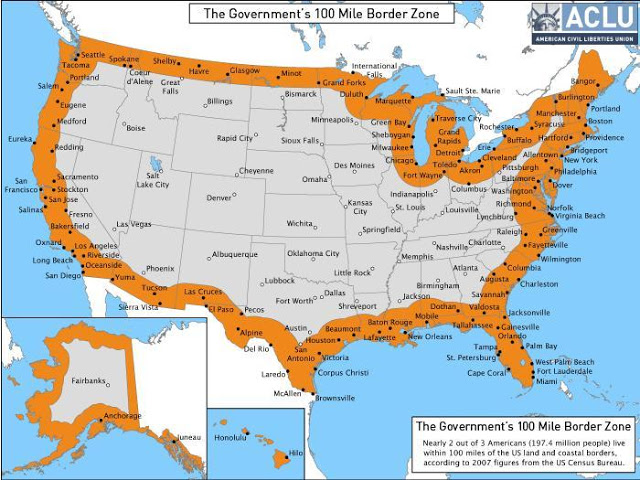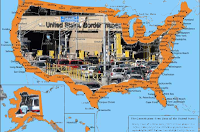| Online: | |
| Visits: | |
| Stories: |

| Story Views | |
| Now: | |
| Last Hour: | |
| Last 24 Hours: | |
| Total: | |
Constitution-Free Zones Are Not a Conspiracy
While this may seem antiquated to some politicians, the aforementioned amendment is still under attack, especially with the concept of Constitution-Free Zones.
Before, I expound upon the foundation of Constitution-Free Zones, the following video should give some insight to the topic.
http://www.foxnews.com/politics/2014/01/13/constitution-free-zones-controversial-obama-administration-policy/
With this in mind, let’s now get down to the nitty gritty.
I know the phrase seems archaic, given the fact I’m 31-years-old, but bear with me.
In December of 2013, District Judge Edward Korman, finally made his ruling, after the American Civil Liberties Union (ACLU) filed a law suit in 2010 on behalf of Islamic Studies student, Pascal Abidor, then 29-years-old.
“Abidor was sitting in the train’s cafe car when an officer forced him to take out his laptop then “ordered Mr. Abidor to enter his password,” the suit claimed. The computer contained images of Hamas and Hezbollah rallies and the agents, unmoved by Abidor’s assertion the images were related to his studies, handcuffed the young man and kept him detained for three hours, questioning him numerous times.”
The ACLU, claimed that border officials should have a “reasonable suspicion before shifting through someone’s personal files.”
However, Judge Korman ruled, that the area 100 miles inland is a “border exemption.”
 “Laptops have only come into widespread use in the twenty-first century. Prior to that time, lawyers, photographers, and scholars managed to travel overseas and consult with clients, take photographs, and conduct scholarly research,” wrote Korman.
“Laptops have only come into widespread use in the twenty-first century. Prior to that time, lawyers, photographers, and scholars managed to travel overseas and consult with clients, take photographs, and conduct scholarly research,” wrote Korman.
No one ever suggested the possibility of a border search had a chilling effect on his or her First Amendment rights. While it is true that laptops make overseas work more convenient, the precaution plaintiffs may choose to take to ‘mitigate’ the alleged harm associated with the remote possibility of a border search are simply among the many inconveniences associated with international travel.
As one can expect, the ACLU was livid regarding the ruling.
“We’re disappointed in today’s decision, which allows the government to conduct intrusive searches of Americans’ laptops and other electronics at the border without any suspicion that those devices contain evidence of wrongdoing,” ACLU attorney, Catherine Crumpshe said.
Suspicionless searches of devices containing vast amounts of personal information cannot meet the standard set by the Fourth Amendment… Unfortunately, these searches are part of a broader pattern of aggressive government surveillance that collects information on too many innocent people, under lax standards, and without adequate oversight.
While this seems shocking, it should really come as no surprise, given the last 15 years of policy making by Congress and Presidents Bush and Obama.
Here is the actual map of what critics call Constitution-Free Zones, which can be viewed on the ACLUs Web site.
 |
| (Image credit: ACLU) |
The Department of Homeland Security’s Office of Civil Rights and Civil Liberties (which could be considered an oxymoron by some), in a two-page executive summary, revealed travelers near the nation’s borders can have their electronic devices seized for any reason.
In 2009, the DHS, one of the responsibilities of which is securing our borders, stated it would conduct a “Civil Liberties Assessment” into its policy of suspicionless search-and-seizures of electronic devices.
While the assessment was originally supposed to be delivered in around 120 days, it actually took three years of waiting before the review was issued.
“We also conclude that imposing a requirement that officers have reasonable suspicion in order to conduct a border search of an electronic device would be operationally harmful without concomitant civil rights/civil liberties benefits,” the executive summary stated.
 The suspicionless search-and-seizure policy began in 2008 under the Bush administration.
The suspicionless search-and-seizure policy began in 2008 under the Bush administration.
In that year, U.S. Customs and Border Protection (CBP), an agency under the umbrella of the DHS, declared CBP had the right to search laptops, electronic devices and printed material of any traveler (U.S. citizen or non-citizen) at the border, “absent individualized suspicion.”
So far the same policy is being continued under President Barack Obama.
Between 2008 and 2010, 6,500 persons have had their various electronic devices searched.
With the Fourth Amendment, you might logically think they would be legally protected from such searches.
Sadly, you would be wrong, since the protection does not apply to the border and could actually stretch 100 miles inland, because of a “Constitution-Free Zone,” as the American Civil Liberties Union refers to it.
A great video to watch on this is Border Patrol (100 miles from the border), which is embedded below:
https://www.youtube.com/watch?v=NPOuj-WzAoA
“There should be a reasonable, articulate reason why the search of our electronic devices could lead to evidence of a crime,” Catherine Crump, an ALCU staff attorney said.
“That’s a low threshold,” said Crump.
“This is a civil liberties watchdog office. If it is doing its job property, it is supposed to objectively evaluate. It has the power to recommend safeguard to Americans’ rights. The office has not done that and the public has the right to know why,” Crump said.
According to the ACLU, “The Constitution-Free Zone” of the United States, encompasses all borders affecting 197.4 million people.
Here are some more cases, such as the one above, where the Customs and Border Protection overreached.
- Between 2006 and 2010 in the Rochester, NY, area, approximately 300 immigrants with legal status were arrested by Border Patrol agents, then released. The arrests coincided with an incentive program that rewarded agents with cash bonuses and Home Depot gift cards based on the number of arrests they made.
- According to the ACLU of Arizona, in Tucson, community members report CBP agents entering courthouses and hospitals (including maternity wards) and approaching and interrogating hospital patients, motorists, and pedestrians. A patient at University of Arizona Medical Center was reportedly forced to deliver her child with a CBP agent in the room. CBP agents in Tucson regularly respond to calls to investigate from police, hospital staff, and school officials. These incidents often result from and encourage racial profiling of U.S. citizens and lawful residents.
- In April 2012, residents of the Olympic Peninsula in Washington State filed a class action lawsuit challenging the Border Patrol’s practice of stopping vehicles and interrogating occupants without legal justification.CBP settled the lawsuit and agreed to require training for Border Patrol agents in the area on Fourth Amendment protections against illegal searches and seizures, and to provide the ACLU with data regarding all traffic stops that take place in the area for the next 18 months.These terms should be extended nationwide and data collected from CBP checkpoints as well as roving patrols.
Let’s hope this abuse of power is challenged and our right to be protected from unreasonable searches and seizures are restored.
One suggestion by the ACLU is this.
The “100 Mile Rule” has never been subjected to meaningful debate or scrutiny in Congress. There is nothing in the record to indicate whether the Justice Department’s designation of 100 miles as a “reasonable distance” was anything other than an arbitrary selection. To prevent CBP from engaging in operations far from the border where border crossers are few and far between, and legitimate travel and commerce are currently often impeded, we urge restricting CBP’s authority to no more than 25 miles from the border and limiting incursions onto private property to no more than 10 miles.
As Ben Franklin once said, “They who can give up essential liberty to obtain a little temporary safety, deserve neither liberty nor safety.”
———————————————————–
Side Bar: This Information comes from the ACLU (also look into the federal court cases on this site about this issue).
The Problem
- The Fourth Amendment of the U.S. Constitution protects Americans from random and arbitrary stops and searches.
- According to the government, however, these basic constitutional principles do not apply fully at our borders. For example, at border crossings (also called “ports of entry”), federal authorities do not need a warrant or even suspicion of wrongdoing to justify conducting what courts have called a “routine search,” such as searching luggage or a vehicle.
- Even in places far removed from the border, deep into the interior of the country, immigration officials enjoy broad—though not limitless—powers. Specifically, federal regulations give U.S. Customs and Border Protection (CBP) authority to operate within 100 miles of any U.S. “external boundary.”
- In this 100-mile zone, Border Patrol agents have certain extra-Constitutional powers. For instance, Border Patrol can operate immigration checkpoints.
- Border Patrol, nevertheless, cannot pull anyone over without “reasonable suspicion” of an immigration violation or crime (reasonable suspicion is more than just a “hunch”). Similarly, Border Patrol cannot search vehicles in the 100-mile zone without a warrant or “probable cause” (a reasonable belief, based on the circumstances, that an immigration violation or crime has likely occurred).
- In practice, Border Patrol agents routinely ignore or misunderstand the limits of their legal authority in the course of individual stops, resulting in violations of the constitutional rights of innocent people. These problems are compounded by inadequate training for Border Patrol agents, a lack of oversight by CBP and the U.S. Department of Homeland Security, and the consistent failure of CBP to hold agents accountable for abuse. Thus, although the 100-mile border zone is not literally “Constitution free,” the U.S. government frequently acts like it is.
Much of U.S. population affected
- Many people think that border-related policies only impact people living in border towns like El Paso or San Diego. The reality is that Border Patrol’s interior enforcement operations encroach deep into and across the United States, affecting the majority of Americans.
- Roughly two-thirds of the United States’ population lives within the 100-mile zone—that is, within 100 miles of a U.S. land or coastal border. That’s about 200 million people.
- Connecticut, Delaware, Florida, Hawaii, Maine, Massachusetts, New Hampshire, New Jersey, New York, Rhode Island and Vermont lie entirely or almost entirely within this area.
- Nine of the ten largest U.S. metropolitan areas, as determined by the 2010 Census, also fall within this zone: New York City, Los Angeles, Chicago, Houston, Philadelphia, Phoenix, San Antonio, San Diego and San Jose.
Outdated Legal Authority and Lack of Oversight
- The regulations establishing the 100-mile border zone were adopted by the U.S. Department of Justice in 1953—without any public comments or debate. At the time, there were fewer than 1,100 Border Patrol agents nationwide; today, there are over 21,000.
- The Border Patrol often ignores this regulation and rejects any geographic limitation on agents’ authority. At least two federal circuit courts condone Border Patrol operations outside the 100-mile zone, federal regulations and Supreme Court precedent notwithstanding.
- Federal border agents are stopping, interrogating, and searching Americans on an everyday basis with absolutely no suspicion of wrongdoing, and often in ways that our Constitution does not permit.
- For example, Border Patrol, according to news reports, operates approximately 170 interior checkpoints throughout the country (the actual number in operation at any given time is not publicly known). The ACLU believes that these checkpoints amount to dragnet, suspicionless stops that cannot be reconciled with Fourth Amendment protections. The Supreme Court has upheld the use of immigration checkpoints, but only insofar as the stops consist only of a brief and limited inquiry into residence status. Checkpoints cannot be primarily used for drug-search or general law enforcement efforts. In practice, however, Border Patrol agents often do not limit themselves to brief immigration inquiries and regularly conduct criminal investigations and illegal searches at checkpoints. The Border Patrol also frequently pulls over motorists in “roving patrol” stops, often without any suspicion that an immigration violation has occurred.
- The ACLU has documented numerous cases of abuse by Border Patrol and filed lawsuits to obtain more information about the agency’s practices. Given Border Patrol’s lack of transparency, and in the absence of any meaningful oversight, there is still much that we don’t know about the full extent and impact of these interior “border enforcement” operations.
Part of a Broader Problem
- The spread of border-related powers inland is inseparable from the broader expansion of government intrusion in the lives of ordinary Americans. For example, CBP claims the authority to conduct suspicionless searches of travelers’ electronic devices—such as laptops and cell phones—at ports of entry, including international arrivals at airports. These searches are particularly invasive as a result of the wealth of personal information stored on such devices. At least one circuit court has held that federal officers must have at least “reasonable suspicion” prior to conducting such searches and recent Supreme Court precedent seems to support that view.
- These practices also coincide with the spread of numerous border technologies, including watch list and database systems (such as the Automated Targeting System traveler risk assessment program), advanced identification and tracking systems (including electronic passports), and intrusive technological schemes such as the “virtual border fence” and unmanned aerial vehicles (aka “drone aircraft”). With many of these technologies in the hands of private companies, there are powerful financial incentives for the continued “militarization” of the border zone.
- The expansion of government power both at and near the border is part of a trend toward expanding police and national security powers without regard to the effect of such expansion on our most fundamental and treasured Constitutional rights. The federal government’s dragnet approach to law enforcement and national security is one that is increasingly turning us all into suspects. If Americans do not continue to challenge the expansion of federal power over the individual, we risk forfeiting the fundamental rights and freedoms that we inherited—including the right to simply go about our business free from government interference, harassment and abuse.
See the Activist Post Constitution-Free Zone archive HERE
You can read more from Bauer Marshall at his site falseempowerment, where this article first appeared.
Source: http://www.activistpost.com/2015/06/constitution-free-zones-are-not.html




